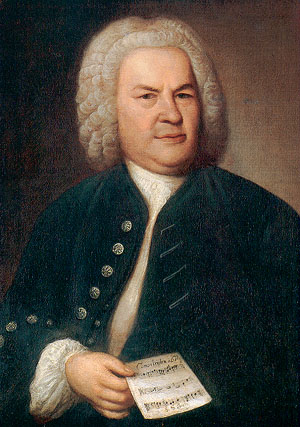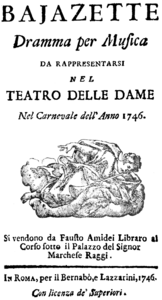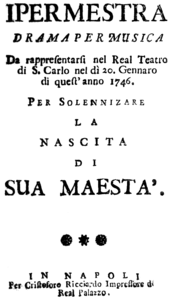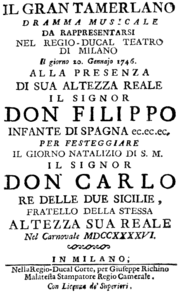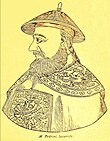Music year 1746
◄◄ | ◄ | 1742 | 1743 | 1744 | 1745 | Music year 1746 | 1747 | 1748 | 1749 | 1750 | ► | ►►
Overview of the music years
Further events
| Music year 1746 | |
|---|---|
| Johann Sebastian Bach 1746, with riddle canon (oil painting by Elias Gottlob Haußmann ) |
Events
Johann Sebastian Bach
- Johann Sebastian Bach has been the Thomaskantor and musical director of the Thomaskirche in Leipzig since May 30, 1723 . From 1729 to 1741, perhaps even until 1746, he was also the director of the Collegium musicum founded in 1701 by Georg Philipp Telemann . The concerts take place once or twice a week in the Zimmermannisches Caffee-Hauß (destroyed in the war in 1943) or in the associated garden.
- In the 1740s, Bach - with a few exceptions - withdrew from new compositions for the church. In addition to commissioned work for secular occasions, he concentrates entirely on extensive works for the harpsichord. His eyesight also deteriorates more and more.
- Bach has an excellent reputation as an organ expert. He is called in for numerous new and reconstructed organs: for example in Zschortau in 1746 to appraise the organ by Johann Scheibe in the Nikolaikirche Zschortau and in Naumburg to appraise the organ by Zacharias Hildebrandt in the Wenceslas Church .
- Johann Sebastian Bach is portrayed for the first time by the painter Elias Gottlob Haussmann . Haussmann painted a second version of the picture in 1748.
georg Friedrich Handel
- George Frideric Handel has lived in London at 25 Brook Street since July / August 1723 and lived here on two floors until his death in 1759. Almost all works created since 1723 are composed in this house. Preparations for the performances often take place in the Handel dining room .
- From 1743 to 1752 Handel composed a continuous series of one or two new oratorios per season, most of them on themes from the Old Testament. Aristocratic circles are still trying to bring Handel down for some time. “The entire opera company is in a rage over Handel,” notes a contemporary . In contrast to the times of aristocratic opera, he has no competition as an oratorio composer, but his opponents organize balls and banquets in the evenings of his performances to harm him.
- February 14th : An Occasional Oratorio , an oratorio by George Frideric Handel based on a libretto by Newburgh Hamilton based on a poem by John Milton and Edmund Spenser , is premiered in London at the Theater Royal, Covent Garden.
Domenico Scarlatti
- Domenico Scarlatti is the Portuguese princess Maria Bárbara de Bragança , whom he met at the court of the pious and extravagant King John V in Lisbon and taught as a music teacher, after her marriage to the Spanish heir to the throne Don Fernando of Asturias (from 1746 King Ferdinand VI. ) followed to Spain. From October 1730 to May 16, 1733, the Alcázares Reales in Seville was his permanent residence and place of work. Then the farm moves north to the area around Madrid , where, depending on the season, it alternates between the castles of Buen Retiro , El Pardo , Aranjuez , La Granja and El Escorial . Scarlatti is probably still in the "private" service of Maria Bárbara and seems to devote himself almost exclusively to the harpsichord and the composition of his sonatas.
- Scarlatti has been married to his second wife, Anastasia Ximénez, from Cádiz at the latest since 1742.
Georg Philipp Telemann
- Georg Philipp Telemann has been Cantor Johannei and Director Musices of the city of Hamburg since 1721 , one of the most respected musical offices in Germany. In this position Telemann undertook to compose two cantatas per week and one passion per year, but in later years he would fall back on earlier works for his cantatas. He also composes numerous pieces of music for private and public occasions, such as memorial days and weddings.
- Telemann's brother Heinrich Matthias Telemann, born in 1672, died in 1746 as an Evangelical Lutheran pastor in Wormstedt near Apolda .
Other biographical events
- Giuseppe Matteo Alberti , who has been a member of the Accademia Filarmonica in Bologna since 1705 , is appointed chairman ( principe ) of the Accademia Filarmonica for the sixth time .
- Carl Philipp Emanuel Bach was promoted to chamber musician in Berlin in the service of Frederick II .
- Wilhelm Friedemann Bach becomes music director and organist at the Marienkirche in Halle (Saale) in April .
- Farinelli , who has lived in Spain since 1737 and sang exclusively for King Philip V , who suffered from severe depression for nine years , was appointed director of Italian opera by Queen Maria Barbara de Bragança , a passionate opera lover, after his death in 1746 . In this function, Farinelli will invite the most important singers in Italy to Madrid in the following years.
- During his travels through Europe, Christoph Willibald Gluck stops in London together with Georg Christian von Lobkowitz . There, on January 7 his opera Caduta de 'Giganti , on 4 March his opera Artamene listed, but both have little success. In the same year Gluck printed six trio sonatas in London , which he probably wrote in Italy.
- The painter and engraver Johann Jacob Haid makes a copper engraving for the composer and music theorist Johann Mattheson .
- Unico Wilhelm van Wassenaer worked as ambassador in Cologne in 1746 .
- Johann Gotthilf Ziegler applies in Halle to succeed the late Gottfried Kirchhoff as music director and organist of the Marktkirche, but Wilhelm Friedemann Bach is accepted for this position.
World premieres
Stage works
Opera
- January 1 : The libretto La pace fra la virtù e la bellezza by Liborati after Pietro Metastasio is premiered in the setting by Andrea Adolfati at the Teatro di Corte in Modena .
- January 7th : The opera La caduta de 'Giganti by Christoph Willibald Gluck based on a libretto by Francesco Vanneschi premieres at the Haymarket Theater in London (five arias and one duet have been preserved).
- January 7th : The libretto Adriano in Siria by Pietro Metastasio is premiered in the setting by Carl Heinrich Graun at the Königliches Schauspielhaus in Berlin .
- January 8th : The opera Bajazette by Gioacchino Cocchi based on the libretto by Agostino Piovene is performed for the first time in Rome at the Teatro delle Dame.
- January 17th : The opera Demofoonte by Carl Heinrich Graun based on the libretto by Pietro Metastasio is performed for the first time in the Royal Court Opera in Berlin.
- Around January 22nd : Andrea Adolfatis and Giuseppe Maria Buini's dramma per musica Armida abbandonata based on the libretto by Francesco Silvani is premiered in Venice at the Teatro San Moisè .
- January 28 : First performance of the opera Artaserse by Girolamo Abos based on the libretto by Pietro Metastasio at the Teatro San Giovanno Crisostomo in Venice.
- February 6th : The world premiere of the opera Cajo Mario by Niccolò Jommelli based on a libretto by Gaetano Roccaforte takes place in Rome at the Teatro Argentina .
- Carnival: Gioacchino Cocchi's Intermezzi per musica L'ipocondriaco risanato is premiered in Rome at the Teatro Valle .
- March 4 : Christoph Willibald Gluck's opera Artamene based on the libretto by Francesco Vanneschi is premiered at the Haymarket Theater in London (six arias have been preserved).
- May 29 : The children's opera Lo starnuto d'Ercole by Johann Adolph Hasse and Andrea Adolfati, jokingly called “dramma per musica”, based on a libretto by Pier Jacopo Martello, is performed with marionettes in Venice at the opening of the Teatro di San Girolamo. The recitatives, choirs and six arias are by Andrea Adolfati.
- October 4th : Scylla et Glaucus , the only opera by Jean-Marie Leclair , is premiered at the Académie royale de musique in Paris . This season it comes to 17 performances. The libretto is based on Ovid's Metamorphoses .
- November 12 : Niccolò Jommelli's opera Tito Manlio (second version) based on the libretto by Jacopo Antonio Sanvitale based on Matteo Noris premieres in Venice at the Teatro San Giovanni Grisostomo .
- Winter: The Commedia per musica I due fratelli beffati by Gioacchino Cocchi based on a libretto by Eugenio Pigrugispano premieres at the Teatro Nuovo in Naples . Cocchi's wife, the Florentine soprano Elisabetta Giani, takes part in the opera.
- Thomas Arne - Neptune and Amphitrite
- Matteo Capranica - Alcibiade
-
Carl Heinrich Graun - Cajo Fabricio
Oratorio
- February 14th : An Occasional Oratorio , an oratorio by George Frideric Handel based on a libretto by Newburgh Hamilton based on a poem by John Milton and Edmund Spenser , is premiered in London at the Theater Royal, Covent Garden.
- April 9 : The libretto for an azione sacra in two parts Sant'Elena al Calvario by Pietro Metastasio is premiered in the setting by Johann Adolph Hasse in the Hofkapelle in Dresden .
Concerts
- Francesco Geminiani - 6 Concerti grossi, Op. 7th
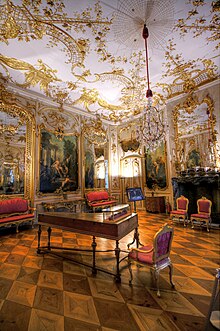
Of the large number of fortepiano that Gottfried Silbermann made, only three have survived. One is in the concert hall of Sanssouci Palace (Freiberg, 1746).
Chamber music
- Christoph Willibald Gluck - 6 trio sonatas (Wq.53, London)
Lute
- Rudolf Straube (1717–1785) - 2 lute sonatas
Viola da gamba
- Carl Philipp Emanuel Bach - Viola da Gamba Sonata in D major (H.559)
violin
- Giuseppe Tartini - 3 Violin Concertos, Book 1
violoncello
- Francesco Geminiani - 6 Sonatas for Violoncello and B. c., Op. 5 / II (Paris)
Keyboard music
harpsichord
-
Carl Philipp Emanuel Bach
- Harpsichord Concerto in A major (H.422)
- Harpsichord Concerto in C major (H.423)
- Giovanni Benedetto Platti - 6 Harpsichord Sonatas, Op. 4 (Nuremberg)
- Joseph-Nicolas-Pancrace Royer - Pieces de clavecin
Vocal music
Spiritually
- Christoph Graupner - Oh Lord, me poor sinner (GWV 1152/46)
Worldly
- Thomas Arne - Lyric Harmony, Vol. Ii
- Johann Sebastian Bach - Canon with six voices (BWV 1076)
- Joseph-Nicolas-Pancrace Royer - Ode à la Fortune (libretto by Jean-Baptiste Rousseau , first performance in December 1746 in Paris at the Concert spirituel )
Popular music
- Burke Thumoth - 12 English and 12 Irish Airs with Variations (London)
Textbooks
- Anonymous - The Compleat Tutor for the French Horn (London)
- William Tans'ur - A New Musical Grammar
Instrument making
Organ in the Saint-Sauveur cathedral in Aix-en-Provence, completed in 1746
Organ in the Saint-Pancrace church in Griesheim-sur-Souffel, completed in 1746
Organ in the abbey church in Marmoutier, completed in 1746
- After three years of construction (1743–1746), Zacharias Hildebrandt completed his largest organ with 53 registers. It is located in the St. Wenzel town church in Naumburg (Saale) . On September 27, 1746, after a four-day test, the joint acceptance test by Gottfried Silbermann and Johann Sebastian Bach takes place . Hildebrandt had resorted to advice from Bach for the disposition .
- Between the organ builders Gottfried Silbermann and Zacharias Hildebrandt there was a reconciliation in a protracted dispute by 1746 at the latest. Silbermann, who had accepted Zacharias Hildebrandt as an apprentice in 1713 , although Hildebrandt could not pay any apprenticeship fees, had contractually obliged Hildebrandt not to work anything after the training "in Sachßen and Alsace in any way, to the detriment of him [= Silbermann]" . When Hildebrandt did not keep to the agreement, a long legal battle broke out between the competitors in the early 1720s. Elector Friedrich August I (August the Strong) decided in 1724 that Hildebrandt was only allowed to take on those orders that Silbermann had previously rejected.
Born
- January 11 : František Adam Míča , Bohemian composer († 1811 )
- February 13 : Giuseppe Cambini , Italian composer and violinist († 1818 or 1825 )
- February 20 : Elisabeth Augusta Wendling , German opera singer († 1786 )
- May 19 : Johann Friedrich Peter , American composer († 1813 )
- May 26 : Johann Friedrich Doles the Younger , German composer and lawyer († 1796 )
- June 2 (baptized): Wilhelm Cramer , German violinist and conductor († 1799 )
- June 3 : James Hook , English composer and organist († 1827 )
- July 2 : Hardenack Otto Conrad Zinck , German chamber musician, composer, music educator and writer († 1832 )
- July 7th : Ludovit Václav Lachnit , Bohemian horn player and composer († 1820 )
- July 9 : Franziska Lang , German soubrette, dancer and actress († 1800 )
- August 10 : Johann Friedrich Wenthin , German organ builder († 1805 )
- August 21 : Ignaz Umlauf , Austrian composer, violist and Kapellmeister († 1796 )
- September 3 : Friedrich Wilhelm Gotter , German writer, poet and librettist († 1797 )
- September 28 : Giovanni Punto , Bohemian horn player, violinist and composer († 1803 )
- September 29 : Ernst Ludwig Gerber , German composer and author († 1819 )
- October 4 : Domenico Corri , Italian composer, impresario, music publisher and singing teacher († 1825 )
- October 7 : William Billings , American composer († 1800 )
- November 15 : Joseph Quesnel , Canadian composer, writer and actor († 1809 )
- December 19 : Maria Magdalena Keverich , citizen of Trier, mother of Ludwig van Beethoven († 1787 )
- December 19 : Venanzio Rauzzini , Italian opera singer (soprano / castrato), pianist, composer and vocal teacher († 1810 )
Exact date of birth unknown
- Marie-Emmanuelle Bayon Louis , French composer, pianist and salonnière († 1825 )
Died
- January 18 : Valeriano Pellegrini , Italian castrato soprano and opera singer (* approx. 1663)
- January 21 : Gottfried Kirchhoff , German organist and composer (* 1685 )
- March 30th : Jean-Joseph Fiocco , Flemish composer and conductor (* 1686 )
- April 15 : Francisco Caporale , Italian composer and cellist (* around 1700 )
- May 4th : Antonio Pollarolo , Italian organist and composer (* 1676 )
- June 13th : Elias Hößler , German organ builder (* 1663 )
- August 8 : Margherita de L'Épine , singer (* approx. 1680 - 1683 )
- August 27 : Johann Caspar Ferdinand Fischer , German composer and musician (* 1662 )
- September 25 : Johann Gottfried Krause , German theologian and hymn poet (* 1685 )
- October 14 : Domenico Alberti , Venetian singer and composer (* around 1710 )
- December 10th : Teodorico Pedrini , Italian missionary, harpsichordist and composer (* 1671 )
Died around 1746
- Vittoria Tarquini , Italian singer (* around 1670 )
See also
Web links
Commons : Music 1746 - Collection of Images, Videos and Audio Files
Commons : Opera Libretti 1746 - Collection of Images, Videos and Audio Files
